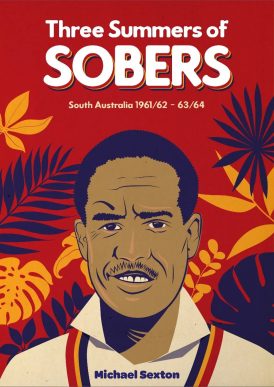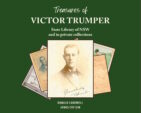Three Summers of Sobers
Archie Mac |Published: 2014

Only Garry Sobers has scored the double of 1000 runs and 50 wickets in the Sheffield Shield, and he did it twice in the three seasons he played for South Australia. Author Michael Sexton provides a brief discourse of Sobers’ time in Australia from 1961 to 1964.
Sexton doesn’t simply focus on the cricket, impressive as it was; he provides insight into the personality of Sobers. While he was a team player who always gave his all, he also liked to party and gamble. It seems Sobers gambled most of the money he earned from his time in Australia.
Ever the professional, Sobers was sponsored by companies in South Australia, and was on incentive payments for runs and wickets. He was also required to conduct training clinics for school children. It appears that whether playing, teaching or socialising, Sobers was totally committed.
The opinion we glean about Sobers from Sexton’s book is that he was the personification of the natural cricketer. His captain at South Australia was the aggressive opener Les Favell. Before one big game, Favell organised a team meeting to talk tactics (a rare thing at the time). No matter which opposition player Favell mentioned, Sobers would tell him not to worry, he would take care of him. Eventually, Favell became annoyed, but Sobers simply stated he would score a century and take a five for. Sobers did just that and after a ten year wait, South Australia won the Sheffield Shield.
Sobers was actually meant to play four years for South Australia, however as he was made captain of the West Indies he didn’t play the last agreed year. Sobers said that his time at South Australia saved his career. His sponsors paid for him to have knee surgery in England which Sobers believed allowed him to continue to play.
For his book Sexton interviewed a number of Sobers’ contemporaries including Richie Benaud and Ian Chappell. The latter was a youngster in the South Australian side when Sobers was there. A few years later they were opposing captains when a World XI replaced South Africa for the 1971/72 tour.
The decision to replace South Africa due to apartheid was made by Sir Donald Bradman, who features throughout the book. He was a huge fan of Sobers and also influential over the great all rounder. Bradman would often ask Sobers for a big effort for South Australia. The class of Sobers meant he rarely let down the great man, and always found that little bit extra when asked by The Don. So impressed was Bradman with a knock of Sobers, he narrated the footage of the innings which was sent to schools and cricket clubs as a coaching tool.
This book, as with all Sexton’s books, is well written and free from boring superfluous detail. Sexton was unable to secure an interview with Garry Sobers, but I had no idea until Sobers was missing from the list of interviewees. This is a quality read and is highly recommended.






Leave a comment